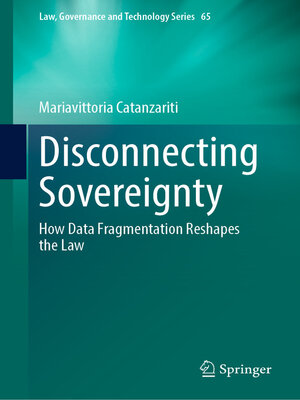Disconnecting Sovereignty
ebook ∣ How Data Fragmentation Reshapes the Law · Law, Governance and Technology Series
By Mariavittoria Catanzariti

Sign up to save your library
With an OverDrive account, you can save your favorite libraries for at-a-glance information about availability. Find out more about OverDrive accounts.
Find this title in Libby, the library reading app by OverDrive.



Search for a digital library with this title
Title found at these libraries:
| Library Name | Distance |
|---|---|
| Loading... |
This book explores the dynamic legal semantics of territory as applied to data. It offers a theoretical assessment of the legal challenges that data flows pose for the principle of territoriality and for state sovereignty more generally. The concept of sovereignty has traditionally developed in close connection with the exercise of powers over a territory, and ideas of jurisdiction have always been based on the principle of territoriality. Digitalization questions however the very idea of physical frontiers. Interconnected networks make data in effect borderless. Data can in fact be created, stored, processed, and accessed anytime and from anywhere.
The idea of the book is upbeat: the law can keep pace with the ability of data to fragment reality. The condition for this is that sovereignty disconnects from territory. Disconnection is not getting rid of the territory once and for all, it only means that for data alternatives to the territorial connection exist.
The analysis focuses on data from a holistic perspective (personal and nonpersonal) with the aim of investigating divergent and convergent solutions provided by different branches of the law (data protection, IP law, international law, and fundamental rights protection). It assesses in particular, the relationships between digitalization and the principle of territoriality, focusing on the specific legal aspects: the connections between law and territory; the impact of digitalization on state sovereignty; the use of extraterritoriality to circumvent territorial limitations on data flows; the rise of digital jurisdiction and its challenges; the interplay between digital jurisdiction and state sovereignty, and the alternative technological and legal solutions to data localization.







